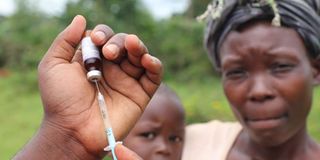Vaccine hesitancy is creeping in and this is why

A health worker prepares the rubella vaccine in Kabondo Kasipul, Homa Bay County.
Every year, immunisation prevents up to three million deaths, illnesses and disabilities caused by 26 vaccine-preventable infections.
Currently, approximately 440 million children worldwide do not receive the vaccines they need. Interestingly, 2019 saw a resurgence of one of the most contagious diseases – measles.
Vaccines remain among the most useful tools for infectious disease prevention, so why are some children not getting vaccinated?
Although lack of access still tops the list of reasons, particularly in developing nations, vaccine hesitancy has become another top threat.
Vaccine hesitancy is defined as a delay in acceptance, or outright refusal to be vaccinated. Trust plays a key role in the public perception of health services, thus influences vaccination decisions. This decision is influence, for instance, by experiences with specific vaccines, at health facilities, conversations among families and friends and religious beliefs.
Laxity is another reason, where people feel certain infectious diseases are no longer a threat as was the case with measles. Traditionally, the approach has been to employ rational logic – that the benefits of vaccines outweigh any risk – to promote vaccination.
However, healthcare providers need to keep in mind that facts do not always translate to trust, neither does rhetoric. The vaccination decision-making process is a mixture of rational and, yes, in a scientific sense, irrational processes. It is interplay of emotional, cognitive, social, cultural, spiritual, religious and scientific facts.
Public health policy makers should listen, explain and answer questions on reasons for vaccination and the procedures involved.
Lucy Mwangi is an infectious disease researcher


